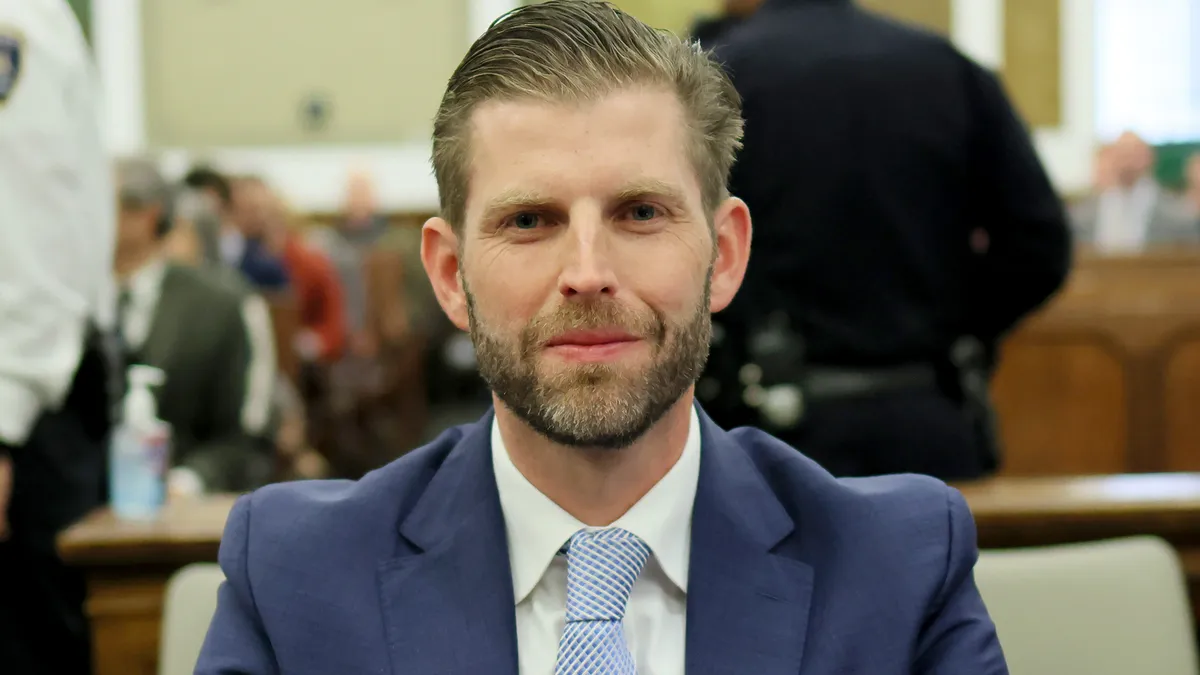Dive Brief:
- The preparation of annual statements of financial condition of the Trump Organization by ex-CFO Allen Weisselberg and former controller Jeffrey McConney between 2014 and 2021 were “materially correct” in the view of Donald Trump Jr., the son of former President Donald J. Trump testified Thursday.
- Assistant Attorney General Colleen Faherty’s line of questioning once again focused in on the extent of Weisselberg’s reach and responsibilities within the organization as both Trump Jr. and his brother Eric Trump testified Thursday in the $250 million civil fraud suit brought against the former president by New York Attorney General Letitia James. Both brothers repeatedly denied culpability surrounding the organization’s financials, instead stating that accounting professionals both in and outside the company held the responsibility for the preparation and accuracy of company reports.
- “Candidly, they probably spent more time in our offices than I did and so I still think that’s materially accurate,” Trump Jr. said Thursday in response to questions by Assistant Attorney General Colleen Faherty regarding whether Weisselberg and McConney performed their work on the statements of financial condition as expected.
Dive Insight:
The two Trump brothers both took the stand Thursday as the NY AG’s civil fraud suit against the former president continues to unfold. The suit alleges that former President Donald J. Trump, alongside his three eldest children and certain senior executives in the organization — including former CFO Weisselberg, also a named defendant in the case — fraudulently inflated the former president’s net worth in order to obtain bank loans on more favorable terms than would have otherwise been available for the organization.
Both EVPs in the Trump Organization, the two brothers were questioned about their level of involvement and knowledge of the organization’s financials and whether those statements were shared with third parties. The NY AG’s office alleges that figures within these statements are fraudulent and would have enabled the organization to obtain more favorable loans.
Taking the stand for a second day as a witness called by the state, Trump Jr. reiterated the position he previously expressed in his Thursday testimony, stating that he would have relied upon the former CFO as well as the rest of the accounting team — including the Trump Organization’s independent accounting firm, Mazars USA — to make accounting decisions.
“Mazars for 30 years is intimately involved in every aspect, every transaction, every LLC, and they would have been involved in compiling anything as it relates to accounting,” Trump Jr. said, adding that undertaking such responsibilities is “why we have accountants.”
In February of last year, Mazars cut ties with the Trump Organization as their accountants, as well as informing the organization that they could no longer rely on the accuracy of a decade’s worth of financial statements, CNN reported at the time.
Taking the stand Thursday following his brother, Eric Trump similarly denied responsibility for the business’ financial statements, insisting that he was not aware that such statements existed and they would not have been part of his responsibilities at his father’s organization.
“I don’t believe I resolved or worked on a statement of financial condition,” Eric Trump said in response to questions from state attorney Andrew Amer. “I don’t believe I would have had knowledge of it.”
In a lengthy back-and-forth peppered by objections of relevance from Trump’s attorneys, Amer continued to press Eric Trump about his level of knowledge of the organization’s financial statements, showing various communications between Weisselberg, McConney and Eric Trump, among other parties, referencing these statements.
In response, Eric Trump, who grew increasingly flustered as the line of questioning continued, repeatedly declined to speculate on what was being shared when shown the communications and heaped responsibility onto Weisselberg.
For example, during questioning surrounding his participation in 2012 negotiations by the Trump Organization regarding the potential purchase of a North Carolina golf club, which appeared to require a club board member to visit the organization’s New York headquarters for a confidential review of the organization’s financials, Eric Trump told the court he didn’t “want to nitpick this.”
“Clearly, the board member came in to review financials and he did so with Allen Weisselberg, not with me,” Eric Trump said.
Eric Trump, who reportedly had a greater hand in the Trump Organization’s day-to-day business than his brother Donald Trump Jr., also denied being cited as a source for the valuation of Trump’s Seven Springs, New York property when asked by Amer about two phone conversations that took place between Eric Trump and former controller McConney, reportedly surrounding the value of the property.
“I understand we had financials as a company and we had an accounting department that would work with third parties…I was not aware of a statement of financial condition; I did not work on a statement of financial condition,” Eric Trump insisted, acknowledging the phone conversations likely took place but stating he did not recall if they discussed the property’s valuation. “I’ve been very clear about that.”
In another tense exchange, Amer brought up a 2013 email between Eric Trump and former controller McConney with the subject line, “DJT F/S.” McConney, in the email, wrote that he was working on the former president’s annual financial statement and was seeking details surrounding the valuation of the Seven Springs property.
In response to questions from Amer, Eric Trump agreed “F/S” stood for financial statement and acknowledged that he was aware both that his father had an annual financial statement and that McConney was asking for his assistance in preparing his father’s annual financial statement.
Former President Trump denies any wrongdoing and he and his attorney have argued that valuations are subjective, with Trump citing disclaimers in the documents that he said leave him off the hook.














